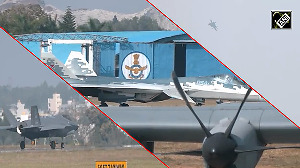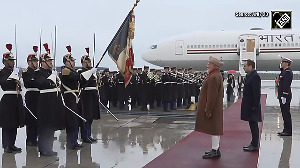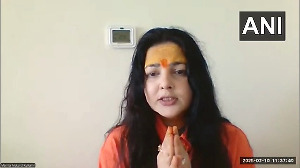
Mani Kumar Subba, the Congress MP from Tezpur, Assam, whose wife and brother-in-law were recently arrested by the Delhi police on suspicion of being involved in the murder of the MP's parliamentary aide, Milan Subba, has always been a controversial figure.
Probably the wealthiest MP from the Northeast, Subba's is a classic rags to riches story.
His affidavit filed with the nomination papers for the 2004 general election shows that he and his two wives are worth Rs 19.8 crore (Rs 190.8 million).
Subba is the Congress' chief moneybag in the Northeast.
He was a member of Assam's legislative assembly before getting a ticket to contest the 1998 Lok Sabha election.
Since then he has not looked back. That he managed to secure a Congress ticket this time despite his alleged involvement in a lottery scam in neighbouring Nagaland is testimony to his clout in the Congress party.
Subba's original name is said to be Mani Raj Limboo. Alleged to be a resident of Nepal, he was reportedly refused enrolment as an Indian voter in the 17 Central Pendam assembly segment in Sikkim in 1985.
This followed a complaint lodged by Ashok Kumar Subba of the then Janata Party, who said he was a foreign national with a permanent address at Ekhabo Panchayat, Ward No 8, Taplezum District, Mechi Anchal, Nepal.
Reports say he was born in village Sangsabu of Tamarkhola Ekhabu Gram Panchayat in Taplezum district and that in 1962 he came to Sikkim, then an independent country, where he began his career as a cardamom plantation labourer.
In 1965 he migrated to Tinsukia in Upper Assam, where he set up a gambling business.
After some years he went to Arunachal Pradesh and married a relative of the state's current chief minister, Gegong Apang. She is now said to live in Harmotti, north Assam.
This link brought him fortune and he became one of the biggest contractors in Arunachal Pradesh.
In 1991, Assam Congress chief Hiteswar Saikia offered him a ticket to contest the election from the Naoboicha assembly constituency.
In December 1997, G K Pillai, joint secretary, Union home ministry, acting on a complaint from then Assam chief minister Prafulla Kumar Mahanta, asked the Central Bureau of Investigation to inquire into allegations that Subba was a foreign national.
On January 5, 1998, the CBI registered a preliminary case against him.
There was also a case of defaulting in payments to the governments of Sikkim, Manipur and Nagaland while running lotteries on their behalf.
But the biggest financial controversy that Subba is alleged to be involved in is the Nagaland State Lottery scam.
His family owns MS Associates, a major player in the lottery business, which came under the scanner after the Comptroller and Auditor General detected a massive scam in the conduct of the Nagaland State Lottery in 1999.
The CAG report dealt exclusively with the running of the Nagaland State Lottery, of which MS Associates had been appointed the 'state sole distributor' in 1994.
In raids conducted at several places in Delhi, Kohima, Guwahati and Shillong, sackloads of documents were picked up. Finance ministry officials claim some 'subsidiary' scams involving several politicians and industrialists were unearthed.
Apparently, the state government earned only minuscule revenue from the lottery, which ran for four years and had a turnover of thousands of crores of rupees.
While 91 percent of the face value of tickets was to be paid as prize money, only 78 percent was actually given away. The winners were thus cheated of Rs 5,000 crore or Rs 50 billion.
'In the absence of any evidence to the contrary, it can be assumed that this amount was not paid as prize money and was retained by the distributor,' the CAG report said.
The audit began in 1997, a marathon exercise that scrutinised the running of the Nagaland State Lottery from 1993 through 1997. In these years, 83,254 lottery draws were conducted, of which the CAG examined 42,459.
The CAG has calculated that of the Rs 38,297 crore (Rs 382.97 billion) worth of tickets printed, even a mere 2 percent profit for the distributor, agents, and state government would work out to Rs 766 crore or Rs 7.6 billion.
Even if the state government were to get half the profit, it should have been entitled to Rs 383 crore or Rs 3.83 billion. But it received only Rs 40.2 crore or Rs 400.2 million.
Besides, the directorate made a practice of first depositing the receipts in a savings bank account for up to seven months before submitting them to the treasury.
Image: Rahil Shaikh






 © 2025
© 2025